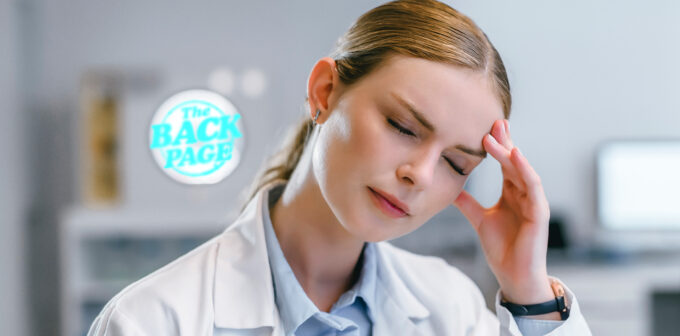But we didn’t need to tell you that.
Your faithful Back Page returned from Asia on an overnight flight at the weekend, and the sleep loss from that relatively easy journey was enough to turn light grocery shopping into a baffling ordeal.
Not sure how we’d go with life-and-death medical decisions.
Lack of sleep has been a routine part of medical training since the Back Page’s progenitors were baby doctors, and presumably long before that too.
It has always boggled our mind that an already stressful, high-stakes and cognitively demanding job should have sleep deprivation thrown in during the years of greatest uncertainty. You’re crossing a tightrope over a shark pool with a baby under one arm and a pan of boiling water in the other hand – now do it on one leg. We all had to.
Plenty of research has been done trying to untangle the various cognitive effects – and defects – resulting from lack of sleep. But to date, the authors of this recent paper in Psychophysiology write, there has been “no clear consensus on the exact effects of sleep loss on risky decision-making behaviour and the underlying brain mechanisms”.
This team put 56 adults with normal sleep patterns through an intense five-day, four-night controlled lab experiment at the University of Pennsylvania. During this time subjects had fMRI scans after a night of good sleep and after a night of being kept awake, and were tested with memory, attention and decision-making tasks.
They were “continuously behaviorally monitored by trained staff in a semi-isolated living area. They were provided meals at regular, pre-specified hours and snacks. Participants wore a wrist actigraph throughout the study and wore ambulatory electroencephalography and electrocardiography recording equipment for 24-hr intervals … When not tested during the study, they were permitted to engage in non-strenuous activities such as reading or watching television. They were not allowed to do any physically demanding tasks, work on laptops, or leave the study environment.”
It’s not going to give Big Brother a run for its money, but it would be kind of fun to watch.
To test risk-taking the team used the BART test – not touching an electrified cupcake but that one with the virtually inflating balloon where you earn more points/money the closer you let it get to virtually exploding.
Contrary to their hypothesis, the researchers found no difference in propensity to risk between the total sleep deprivation (TSD) and rested wakefulness (RW) conditions, nor in overall win ratio, though subjects completed fewer trials after TSD.
The authors acknowledge that 24 hours of wakefulness is only one kind of sleep deprivation, which may be why they didn’t find the increase in risk-taking that some studies have.
The team also examined responses to losses and wins by looking at activity in the anterior cingulate cortex, bilateral insula and bilateral putamen.
In the rested condition, wins produced activity in the bilateral putamen, while losses registered in the bilateral insula and ACC. But in the TSD condition, these regions were quiet – neural responses to outcomes both good and bad were dampened, leading to “behavioral insensitivity to reward outcomes”.
They offer three possible interpretations of their results: 24 hours of TSD affected emotional processing, making people less sensitive to the joys from rewards and the regrets from losses; TSD reduced the release of dopamine in the reward network due to increased tiredness and sleepiness; or participants were overall less engaged in the task or paid less attention to the outcomes.
To get a clearer picture further studies are, of course, needed.
“These results underscore the importance of maintaining adequate sleep and how individuals should refrain from making important decisions when experiencing chronic or acute sleep deprivation,” commented co-first author Dr Zhuo Fang, a data scientist at the University of Ottawa, in the accompanying press release.
“In specific professions where decision-makers are required to operate under accumulated sleep loss, specialised training or fatigue risk management might be necessary to enable them to handle such situations effectively.”
The press release cites “politicians, military generals and first responders” as some of the people who should avoid taking important decisions after a night without sleep.
If it weren’t for the fact that hospital systems across the world would collapse if medical trainees worked sane hours, you could add doctors to that list.
Send well-rested and neuronally activated story tips to penny@medicalrepublic.com.au.


